Report on Social Sustainability Regulations and Practice
VerifiedAdded on 2023/06/09
|8
|1428
|120
Report
AI Summary
This report provides an overview of the current situation in social sustainability regulations and practices, particularly concerning companies from developed countries outsourcing manufacturing to developing nations. It addresses issues such as low-cost labor, the imposition of company values, and investor demands, highlighting the prevalence of child labor and poor working conditions in the apparel industry's supply chains. The report evaluates various sources, including academic articles and industry reports, to analyze the impact of corporate social responsibility and sustainability in developing countries. It emphasizes the importance of independent sourcing, staying updated with governmental regulations, and the need for companies to prioritize social sustainability alongside environmental concerns. The report recommends that companies should avoid social concerns like child labor by intermediating independent sourcing of supply chains from developing countries and stay updated with recent amendments in the regulations made by the government in sustainability reports.
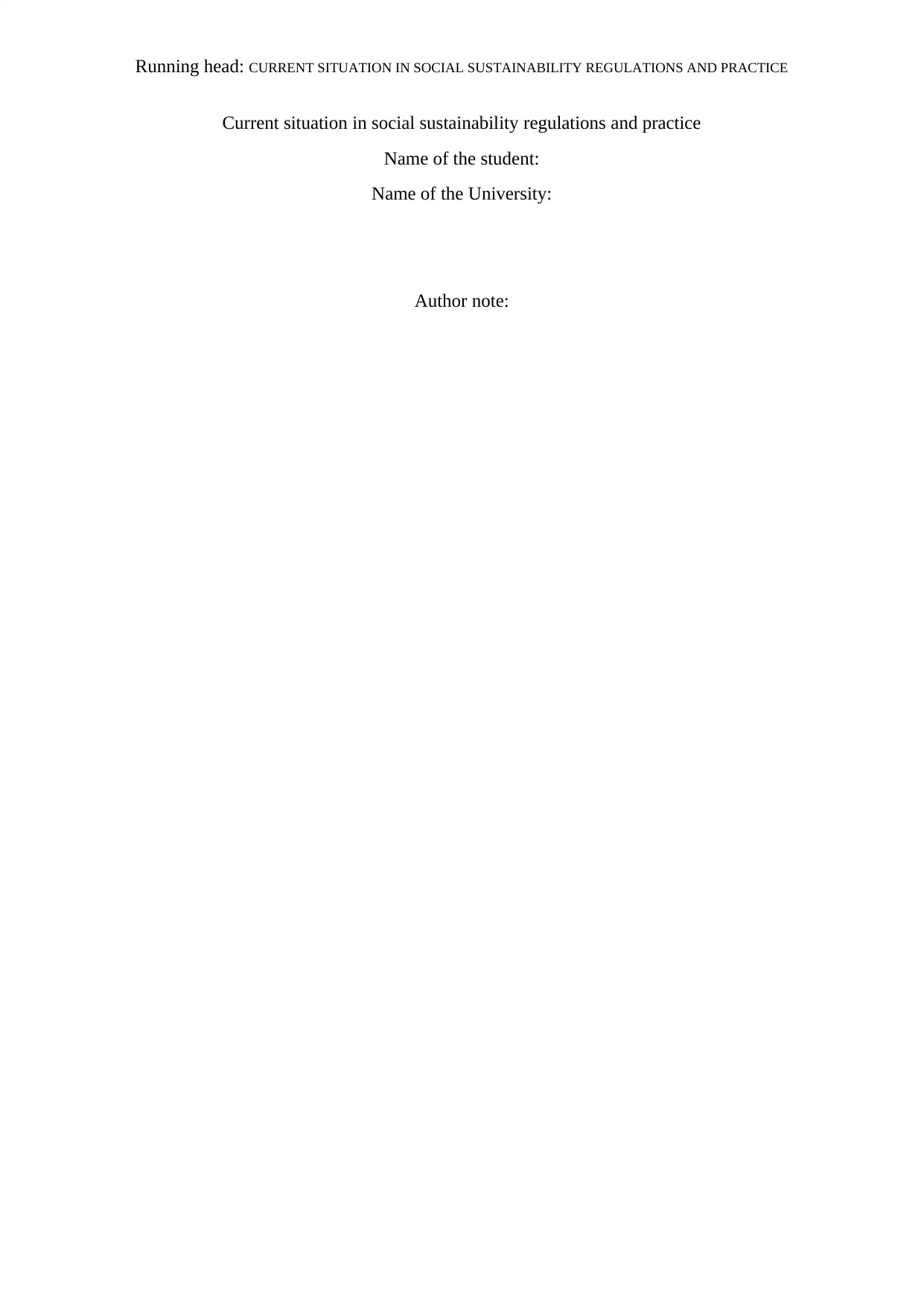
Running head: CURRENT SITUATION IN SOCIAL SUSTAINABILITY REGULATIONS AND PRACTICE
Current situation in social sustainability regulations and practice
Name of the student:
Name of the University:
Author note:
Current situation in social sustainability regulations and practice
Name of the student:
Name of the University:
Author note:
Paraphrase This Document
Need a fresh take? Get an instant paraphrase of this document with our AI Paraphraser
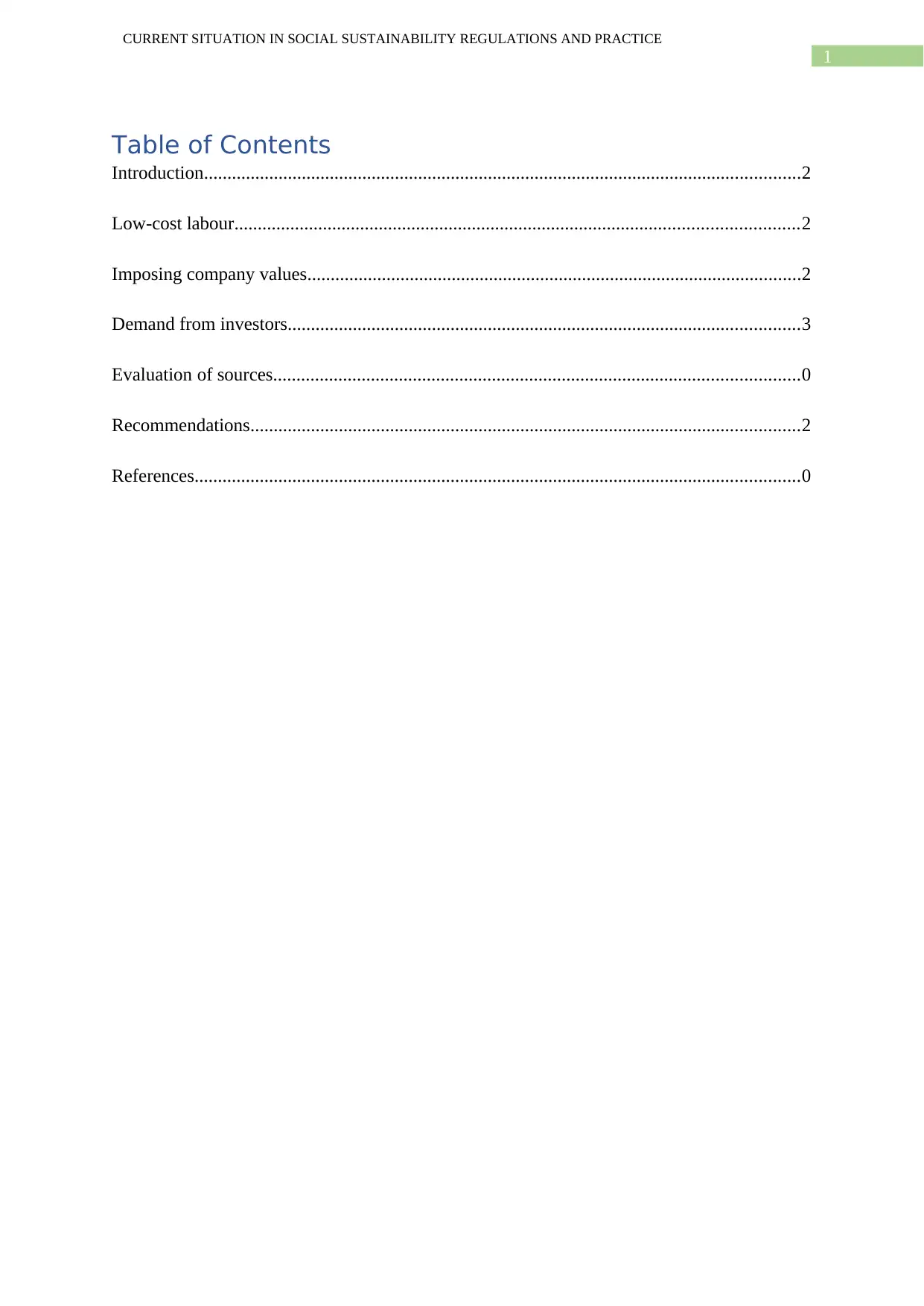
1
CURRENT SITUATION IN SOCIAL SUSTAINABILITY REGULATIONS AND PRACTICE
Table of Contents
Introduction................................................................................................................................2
Low-cost labour.........................................................................................................................2
Imposing company values..........................................................................................................2
Demand from investors..............................................................................................................3
Evaluation of sources.................................................................................................................0
Recommendations......................................................................................................................2
References..................................................................................................................................0
CURRENT SITUATION IN SOCIAL SUSTAINABILITY REGULATIONS AND PRACTICE
Table of Contents
Introduction................................................................................................................................2
Low-cost labour.........................................................................................................................2
Imposing company values..........................................................................................................2
Demand from investors..............................................................................................................3
Evaluation of sources.................................................................................................................0
Recommendations......................................................................................................................2
References..................................................................................................................................0
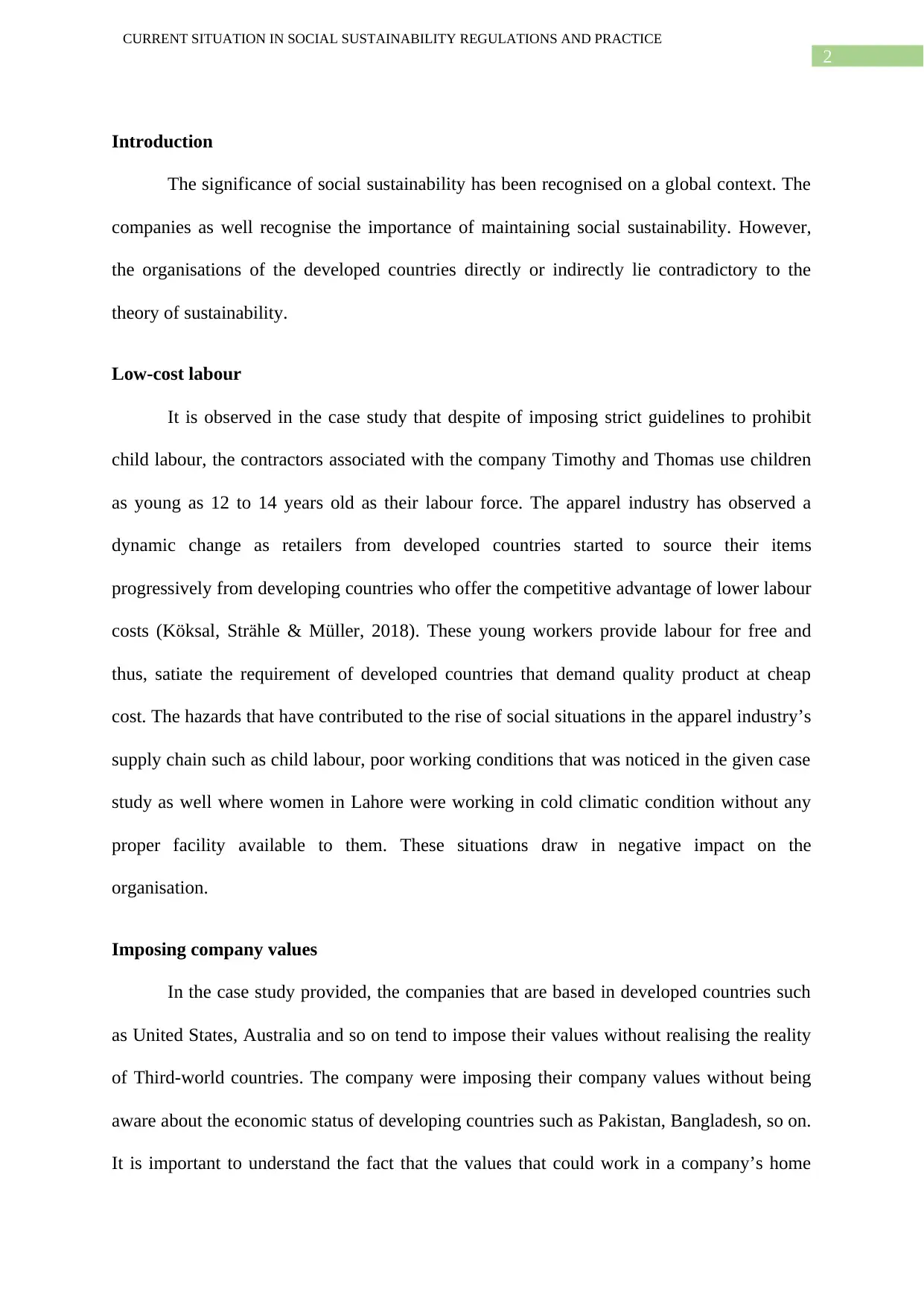
2
CURRENT SITUATION IN SOCIAL SUSTAINABILITY REGULATIONS AND PRACTICE
Introduction
The significance of social sustainability has been recognised on a global context. The
companies as well recognise the importance of maintaining social sustainability. However,
the organisations of the developed countries directly or indirectly lie contradictory to the
theory of sustainability.
Low-cost labour
It is observed in the case study that despite of imposing strict guidelines to prohibit
child labour, the contractors associated with the company Timothy and Thomas use children
as young as 12 to 14 years old as their labour force. The apparel industry has observed a
dynamic change as retailers from developed countries started to source their items
progressively from developing countries who offer the competitive advantage of lower labour
costs (Köksal, Strähle & Müller, 2018). These young workers provide labour for free and
thus, satiate the requirement of developed countries that demand quality product at cheap
cost. The hazards that have contributed to the rise of social situations in the apparel industry’s
supply chain such as child labour, poor working conditions that was noticed in the given case
study as well where women in Lahore were working in cold climatic condition without any
proper facility available to them. These situations draw in negative impact on the
organisation.
Imposing company values
In the case study provided, the companies that are based in developed countries such
as United States, Australia and so on tend to impose their values without realising the reality
of Third-world countries. The company were imposing their company values without being
aware about the economic status of developing countries such as Pakistan, Bangladesh, so on.
It is important to understand the fact that the values that could work in a company’s home
CURRENT SITUATION IN SOCIAL SUSTAINABILITY REGULATIONS AND PRACTICE
Introduction
The significance of social sustainability has been recognised on a global context. The
companies as well recognise the importance of maintaining social sustainability. However,
the organisations of the developed countries directly or indirectly lie contradictory to the
theory of sustainability.
Low-cost labour
It is observed in the case study that despite of imposing strict guidelines to prohibit
child labour, the contractors associated with the company Timothy and Thomas use children
as young as 12 to 14 years old as their labour force. The apparel industry has observed a
dynamic change as retailers from developed countries started to source their items
progressively from developing countries who offer the competitive advantage of lower labour
costs (Köksal, Strähle & Müller, 2018). These young workers provide labour for free and
thus, satiate the requirement of developed countries that demand quality product at cheap
cost. The hazards that have contributed to the rise of social situations in the apparel industry’s
supply chain such as child labour, poor working conditions that was noticed in the given case
study as well where women in Lahore were working in cold climatic condition without any
proper facility available to them. These situations draw in negative impact on the
organisation.
Imposing company values
In the case study provided, the companies that are based in developed countries such
as United States, Australia and so on tend to impose their values without realising the reality
of Third-world countries. The company were imposing their company values without being
aware about the economic status of developing countries such as Pakistan, Bangladesh, so on.
It is important to understand the fact that the values that could work in a company’s home
⊘ This is a preview!⊘
Do you want full access?
Subscribe today to unlock all pages.

Trusted by 1+ million students worldwide
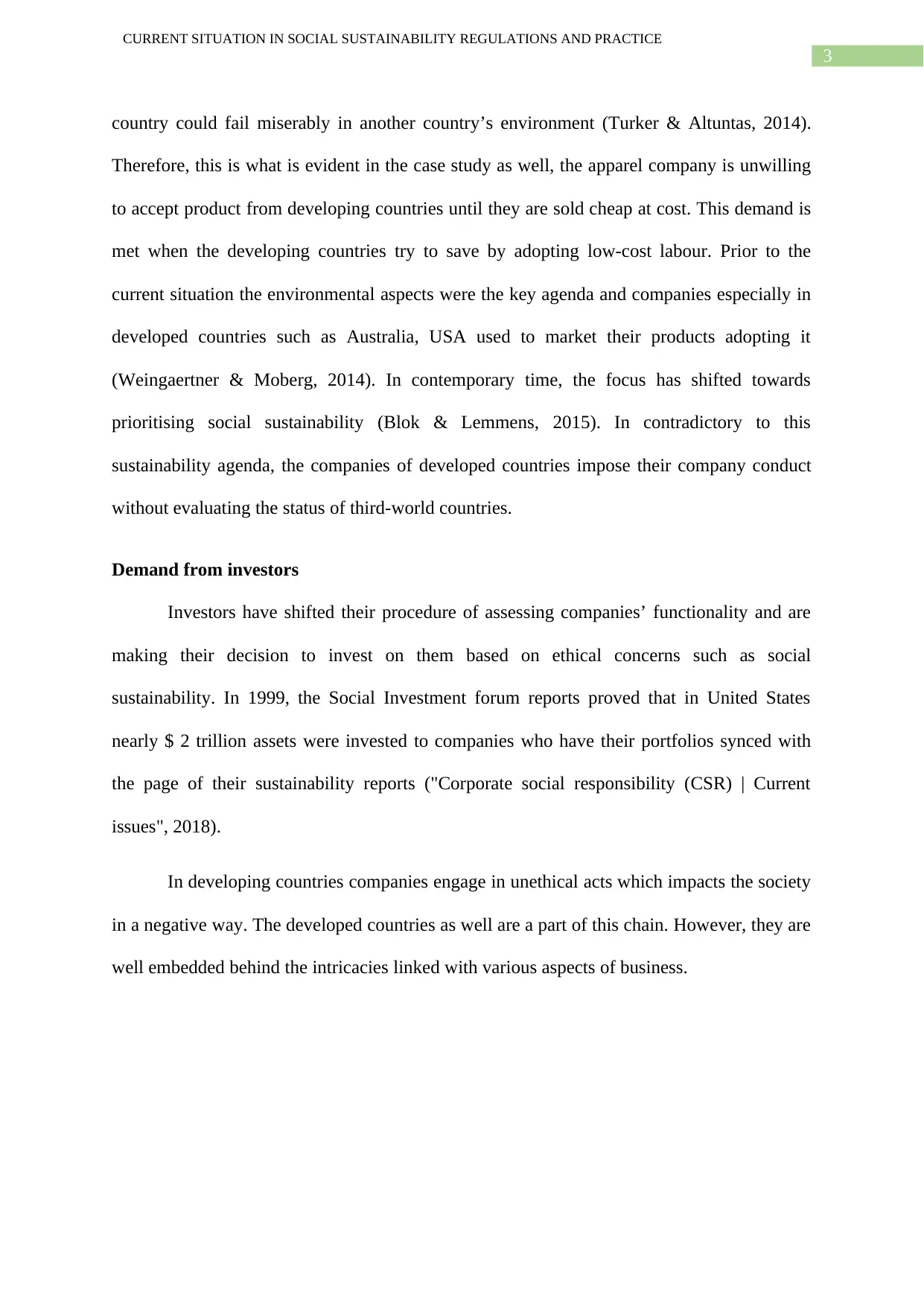
3
CURRENT SITUATION IN SOCIAL SUSTAINABILITY REGULATIONS AND PRACTICE
country could fail miserably in another country’s environment (Turker & Altuntas, 2014).
Therefore, this is what is evident in the case study as well, the apparel company is unwilling
to accept product from developing countries until they are sold cheap at cost. This demand is
met when the developing countries try to save by adopting low-cost labour. Prior to the
current situation the environmental aspects were the key agenda and companies especially in
developed countries such as Australia, USA used to market their products adopting it
(Weingaertner & Moberg, 2014). In contemporary time, the focus has shifted towards
prioritising social sustainability (Blok & Lemmens, 2015). In contradictory to this
sustainability agenda, the companies of developed countries impose their company conduct
without evaluating the status of third-world countries.
Demand from investors
Investors have shifted their procedure of assessing companies’ functionality and are
making their decision to invest on them based on ethical concerns such as social
sustainability. In 1999, the Social Investment forum reports proved that in United States
nearly $ 2 trillion assets were invested to companies who have their portfolios synced with
the page of their sustainability reports ("Corporate social responsibility (CSR) | Current
issues", 2018).
In developing countries companies engage in unethical acts which impacts the society
in a negative way. The developed countries as well are a part of this chain. However, they are
well embedded behind the intricacies linked with various aspects of business.
CURRENT SITUATION IN SOCIAL SUSTAINABILITY REGULATIONS AND PRACTICE
country could fail miserably in another country’s environment (Turker & Altuntas, 2014).
Therefore, this is what is evident in the case study as well, the apparel company is unwilling
to accept product from developing countries until they are sold cheap at cost. This demand is
met when the developing countries try to save by adopting low-cost labour. Prior to the
current situation the environmental aspects were the key agenda and companies especially in
developed countries such as Australia, USA used to market their products adopting it
(Weingaertner & Moberg, 2014). In contemporary time, the focus has shifted towards
prioritising social sustainability (Blok & Lemmens, 2015). In contradictory to this
sustainability agenda, the companies of developed countries impose their company conduct
without evaluating the status of third-world countries.
Demand from investors
Investors have shifted their procedure of assessing companies’ functionality and are
making their decision to invest on them based on ethical concerns such as social
sustainability. In 1999, the Social Investment forum reports proved that in United States
nearly $ 2 trillion assets were invested to companies who have their portfolios synced with
the page of their sustainability reports ("Corporate social responsibility (CSR) | Current
issues", 2018).
In developing countries companies engage in unethical acts which impacts the society
in a negative way. The developed countries as well are a part of this chain. However, they are
well embedded behind the intricacies linked with various aspects of business.
Paraphrase This Document
Need a fresh take? Get an instant paraphrase of this document with our AI Paraphraser
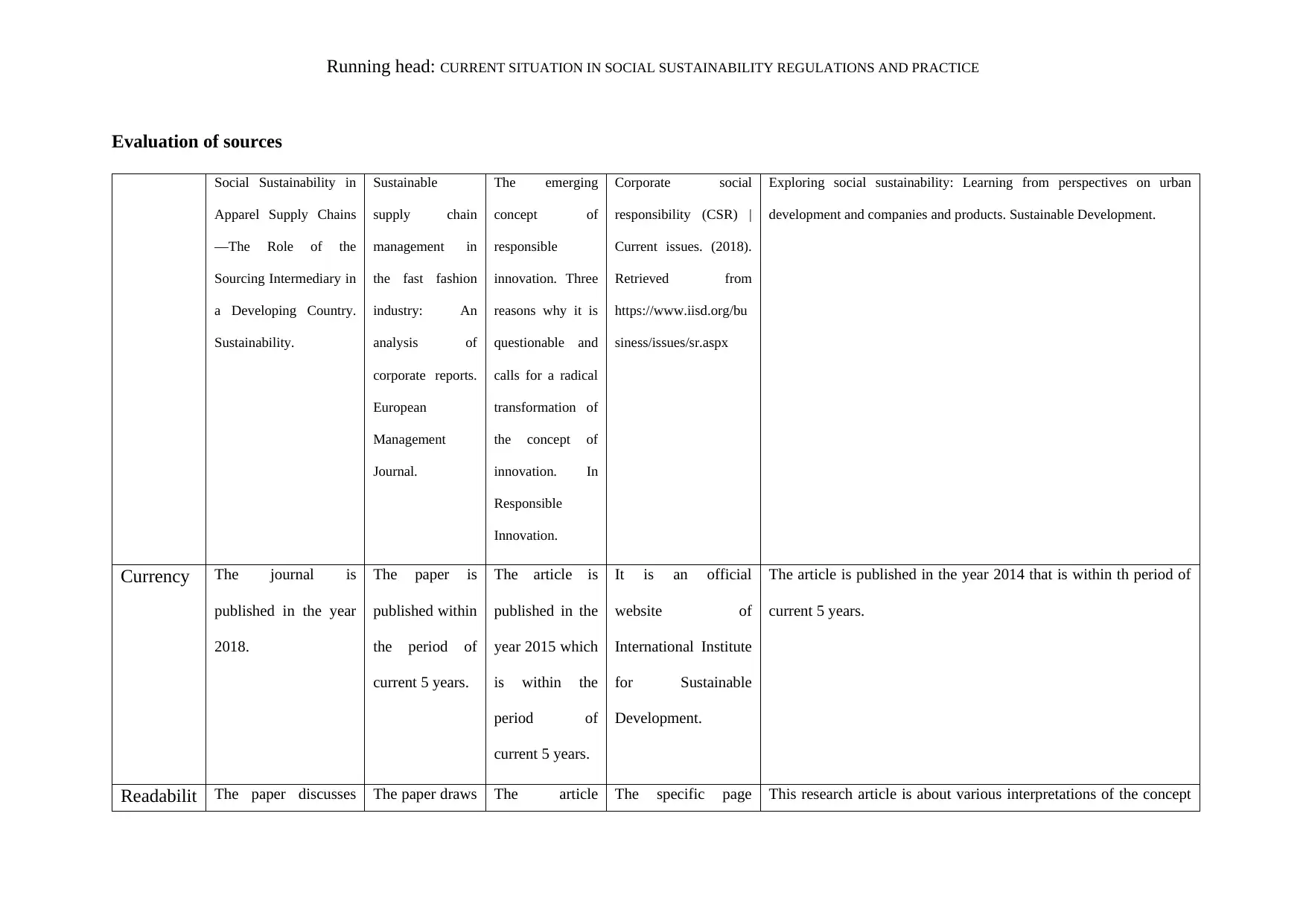
Running head: CURRENT SITUATION IN SOCIAL SUSTAINABILITY REGULATIONS AND PRACTICE
Evaluation of sources
Social Sustainability in
Apparel Supply Chains
—The Role of the
Sourcing Intermediary in
a Developing Country.
Sustainability.
Sustainable
supply chain
management in
the fast fashion
industry: An
analysis of
corporate reports.
European
Management
Journal.
The emerging
concept of
responsible
innovation. Three
reasons why it is
questionable and
calls for a radical
transformation of
the concept of
innovation. In
Responsible
Innovation.
Corporate social
responsibility (CSR) |
Current issues. (2018).
Retrieved from
https://www.iisd.org/bu
siness/issues/sr.aspx
Exploring social sustainability: Learning from perspectives on urban
development and companies and products. Sustainable Development.
Currency The journal is
published in the year
2018.
The paper is
published within
the period of
current 5 years.
The article is
published in the
year 2015 which
is within the
period of
current 5 years.
It is an official
website of
International Institute
for Sustainable
Development.
The article is published in the year 2014 that is within th period of
current 5 years.
Readabilit The paper discusses The paper draws The article The specific page This research article is about various interpretations of the concept
Evaluation of sources
Social Sustainability in
Apparel Supply Chains
—The Role of the
Sourcing Intermediary in
a Developing Country.
Sustainability.
Sustainable
supply chain
management in
the fast fashion
industry: An
analysis of
corporate reports.
European
Management
Journal.
The emerging
concept of
responsible
innovation. Three
reasons why it is
questionable and
calls for a radical
transformation of
the concept of
innovation. In
Responsible
Innovation.
Corporate social
responsibility (CSR) |
Current issues. (2018).
Retrieved from
https://www.iisd.org/bu
siness/issues/sr.aspx
Exploring social sustainability: Learning from perspectives on urban
development and companies and products. Sustainable Development.
Currency The journal is
published in the year
2018.
The paper is
published within
the period of
current 5 years.
The article is
published in the
year 2015 which
is within the
period of
current 5 years.
It is an official
website of
International Institute
for Sustainable
Development.
The article is published in the year 2014 that is within th period of
current 5 years.
Readabilit The paper discusses The paper draws The article The specific page This research article is about various interpretations of the concept
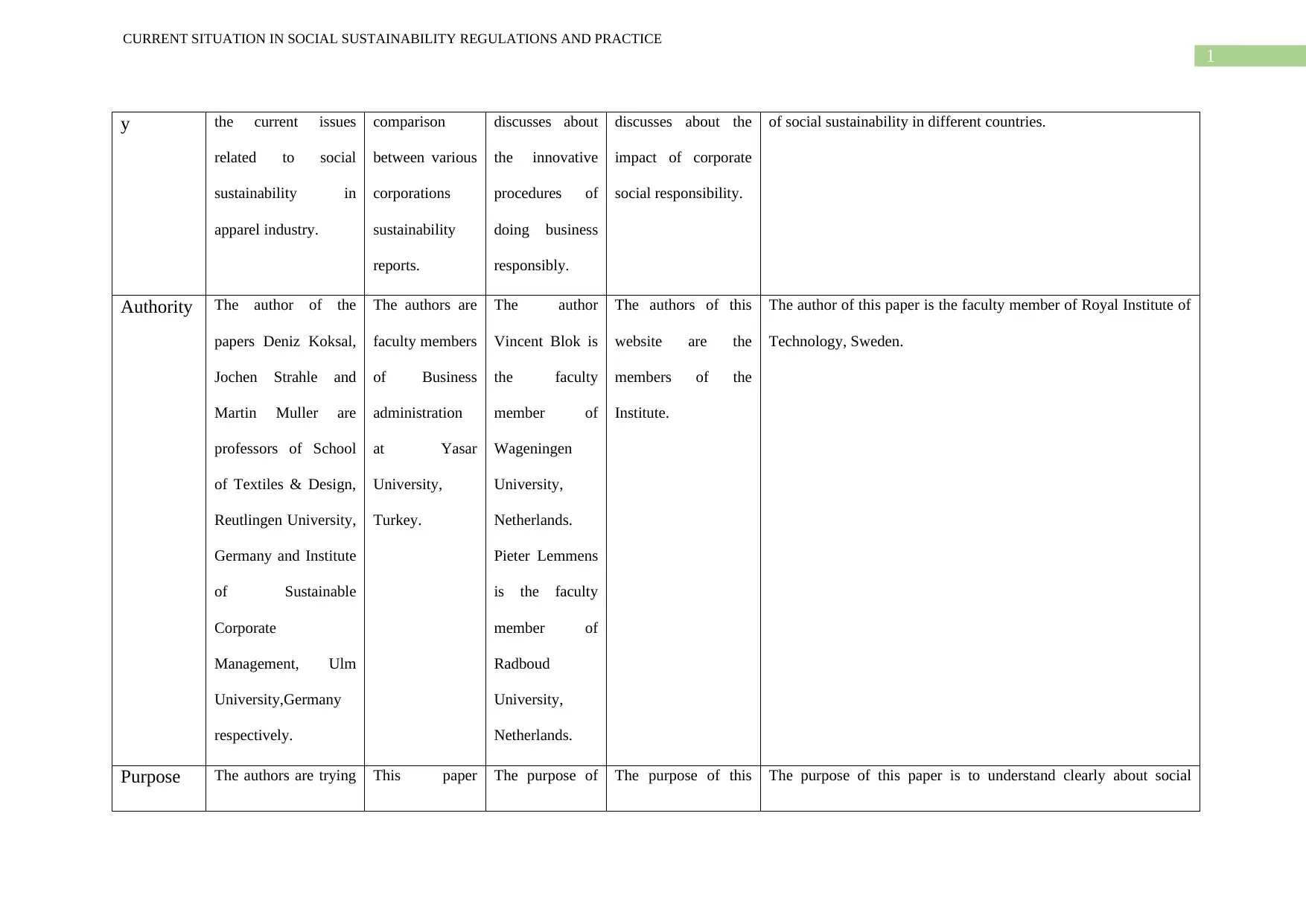
1
CURRENT SITUATION IN SOCIAL SUSTAINABILITY REGULATIONS AND PRACTICE
y the current issues
related to social
sustainability in
apparel industry.
comparison
between various
corporations
sustainability
reports.
discusses about
the innovative
procedures of
doing business
responsibly.
discusses about the
impact of corporate
social responsibility.
of social sustainability in different countries.
Authority The author of the
papers Deniz Koksal,
Jochen Strahle and
Martin Muller are
professors of School
of Textiles & Design,
Reutlingen University,
Germany and Institute
of Sustainable
Corporate
Management, Ulm
University,Germany
respectively.
The authors are
faculty members
of Business
administration
at Yasar
University,
Turkey.
The author
Vincent Blok is
the faculty
member of
Wageningen
University,
Netherlands.
Pieter Lemmens
is the faculty
member of
Radboud
University,
Netherlands.
The authors of this
website are the
members of the
Institute.
The author of this paper is the faculty member of Royal Institute of
Technology, Sweden.
Purpose The authors are trying This paper The purpose of The purpose of this The purpose of this paper is to understand clearly about social
CURRENT SITUATION IN SOCIAL SUSTAINABILITY REGULATIONS AND PRACTICE
y the current issues
related to social
sustainability in
apparel industry.
comparison
between various
corporations
sustainability
reports.
discusses about
the innovative
procedures of
doing business
responsibly.
discusses about the
impact of corporate
social responsibility.
of social sustainability in different countries.
Authority The author of the
papers Deniz Koksal,
Jochen Strahle and
Martin Muller are
professors of School
of Textiles & Design,
Reutlingen University,
Germany and Institute
of Sustainable
Corporate
Management, Ulm
University,Germany
respectively.
The authors are
faculty members
of Business
administration
at Yasar
University,
Turkey.
The author
Vincent Blok is
the faculty
member of
Wageningen
University,
Netherlands.
Pieter Lemmens
is the faculty
member of
Radboud
University,
Netherlands.
The authors of this
website are the
members of the
Institute.
The author of this paper is the faculty member of Royal Institute of
Technology, Sweden.
Purpose The authors are trying This paper The purpose of The purpose of this The purpose of this paper is to understand clearly about social
⊘ This is a preview!⊘
Do you want full access?
Subscribe today to unlock all pages.

Trusted by 1+ million students worldwide
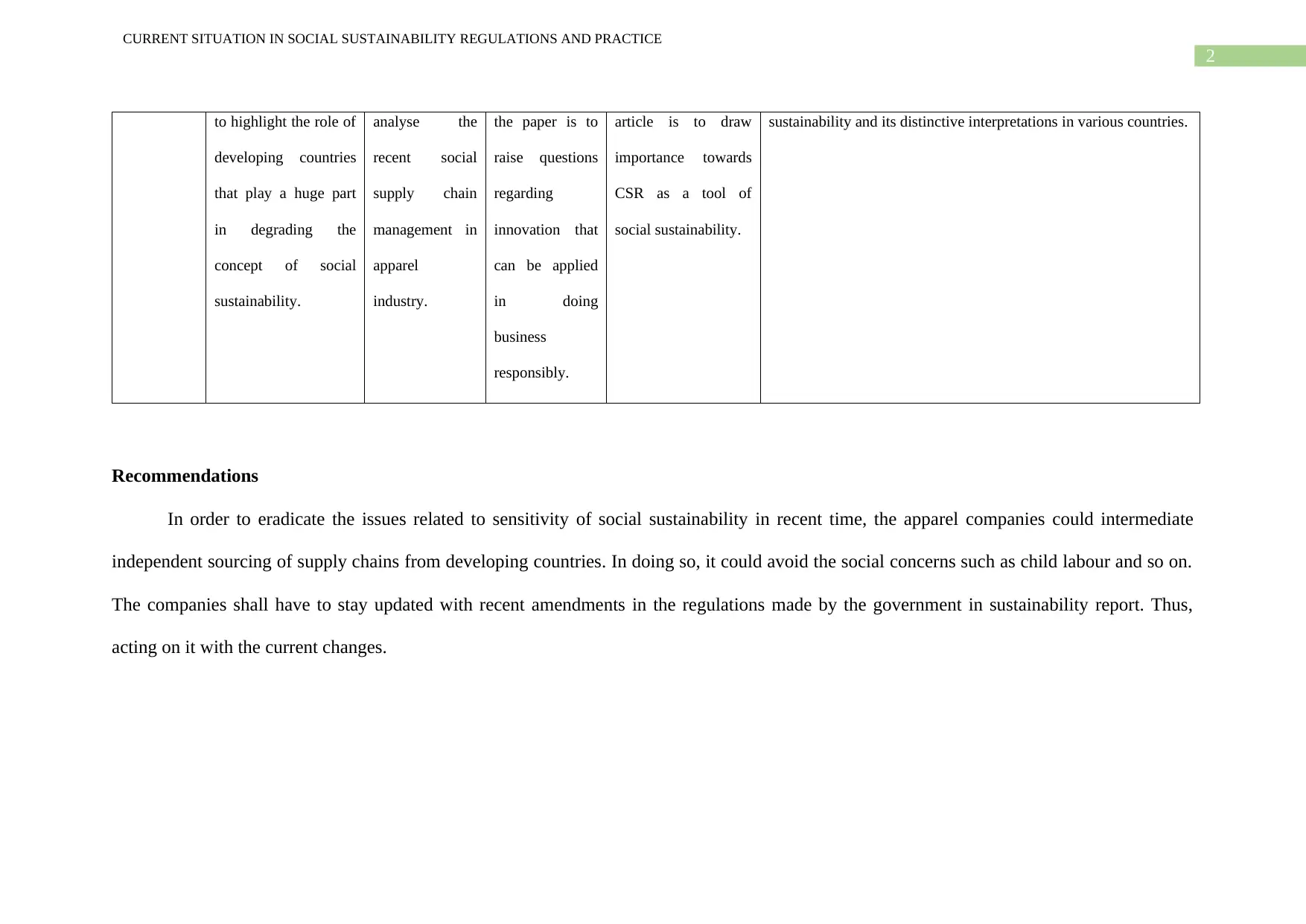
2
CURRENT SITUATION IN SOCIAL SUSTAINABILITY REGULATIONS AND PRACTICE
to highlight the role of
developing countries
that play a huge part
in degrading the
concept of social
sustainability.
analyse the
recent social
supply chain
management in
apparel
industry.
the paper is to
raise questions
regarding
innovation that
can be applied
in doing
business
responsibly.
article is to draw
importance towards
CSR as a tool of
social sustainability.
sustainability and its distinctive interpretations in various countries.
Recommendations
In order to eradicate the issues related to sensitivity of social sustainability in recent time, the apparel companies could intermediate
independent sourcing of supply chains from developing countries. In doing so, it could avoid the social concerns such as child labour and so on.
The companies shall have to stay updated with recent amendments in the regulations made by the government in sustainability report. Thus,
acting on it with the current changes.
CURRENT SITUATION IN SOCIAL SUSTAINABILITY REGULATIONS AND PRACTICE
to highlight the role of
developing countries
that play a huge part
in degrading the
concept of social
sustainability.
analyse the
recent social
supply chain
management in
apparel
industry.
the paper is to
raise questions
regarding
innovation that
can be applied
in doing
business
responsibly.
article is to draw
importance towards
CSR as a tool of
social sustainability.
sustainability and its distinctive interpretations in various countries.
Recommendations
In order to eradicate the issues related to sensitivity of social sustainability in recent time, the apparel companies could intermediate
independent sourcing of supply chains from developing countries. In doing so, it could avoid the social concerns such as child labour and so on.
The companies shall have to stay updated with recent amendments in the regulations made by the government in sustainability report. Thus,
acting on it with the current changes.
Paraphrase This Document
Need a fresh take? Get an instant paraphrase of this document with our AI Paraphraser
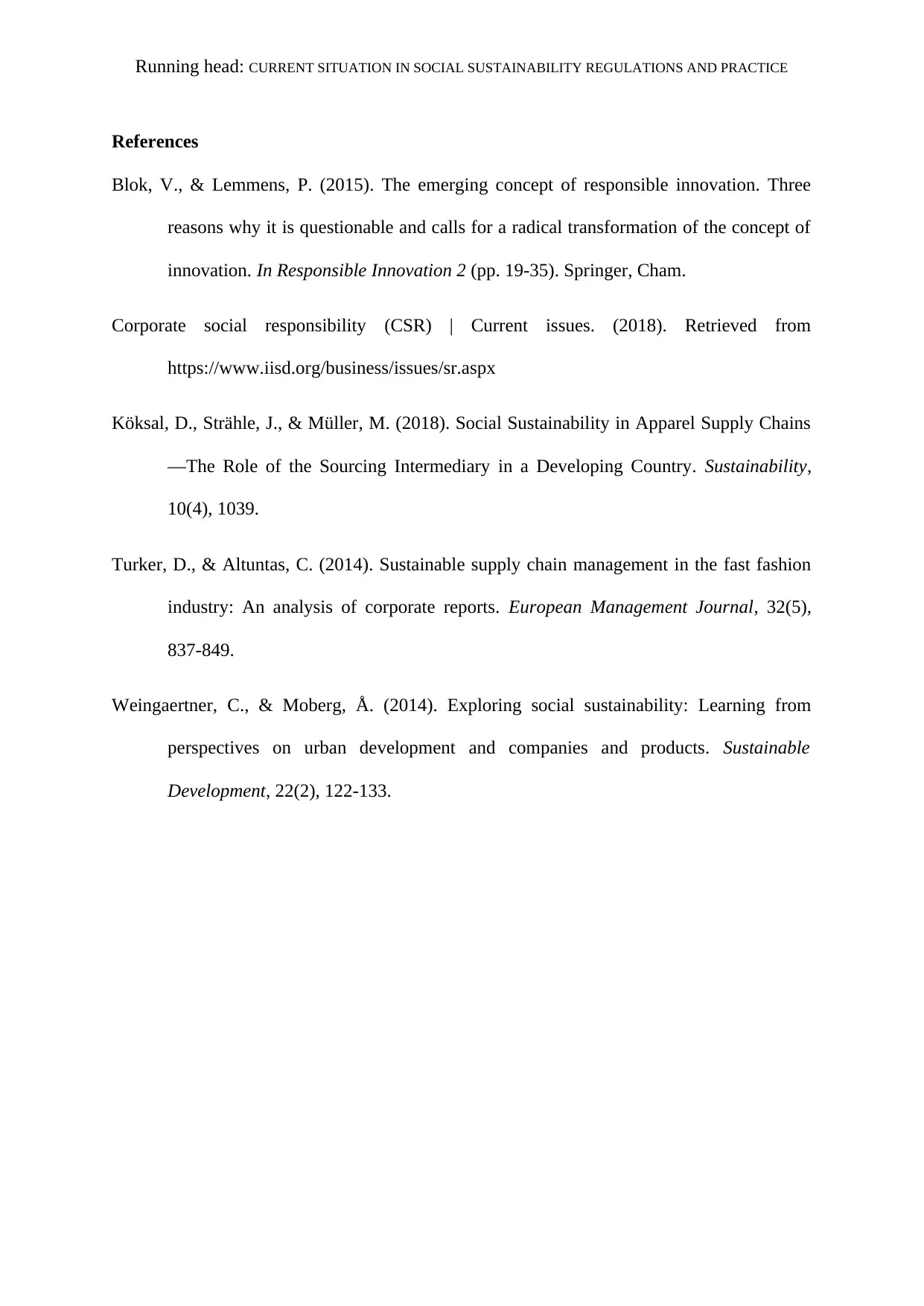
Running head: CURRENT SITUATION IN SOCIAL SUSTAINABILITY REGULATIONS AND PRACTICE
References
Blok, V., & Lemmens, P. (2015). The emerging concept of responsible innovation. Three
reasons why it is questionable and calls for a radical transformation of the concept of
innovation. In Responsible Innovation 2 (pp. 19-35). Springer, Cham.
Corporate social responsibility (CSR) | Current issues. (2018). Retrieved from
https://www.iisd.org/business/issues/sr.aspx
Köksal, D., Strähle, J., & Müller, M. (2018). Social Sustainability in Apparel Supply Chains
—The Role of the Sourcing Intermediary in a Developing Country. Sustainability,
10(4), 1039.
Turker, D., & Altuntas, C. (2014). Sustainable supply chain management in the fast fashion
industry: An analysis of corporate reports. European Management Journal, 32(5),
837-849.
Weingaertner, C., & Moberg, Å. (2014). Exploring social sustainability: Learning from
perspectives on urban development and companies and products. Sustainable
Development, 22(2), 122-133.
References
Blok, V., & Lemmens, P. (2015). The emerging concept of responsible innovation. Three
reasons why it is questionable and calls for a radical transformation of the concept of
innovation. In Responsible Innovation 2 (pp. 19-35). Springer, Cham.
Corporate social responsibility (CSR) | Current issues. (2018). Retrieved from
https://www.iisd.org/business/issues/sr.aspx
Köksal, D., Strähle, J., & Müller, M. (2018). Social Sustainability in Apparel Supply Chains
—The Role of the Sourcing Intermediary in a Developing Country. Sustainability,
10(4), 1039.
Turker, D., & Altuntas, C. (2014). Sustainable supply chain management in the fast fashion
industry: An analysis of corporate reports. European Management Journal, 32(5),
837-849.
Weingaertner, C., & Moberg, Å. (2014). Exploring social sustainability: Learning from
perspectives on urban development and companies and products. Sustainable
Development, 22(2), 122-133.
1 out of 8
Related Documents
Your All-in-One AI-Powered Toolkit for Academic Success.
+13062052269
info@desklib.com
Available 24*7 on WhatsApp / Email
![[object Object]](/_next/static/media/star-bottom.7253800d.svg)
Unlock your academic potential
Copyright © 2020–2026 A2Z Services. All Rights Reserved. Developed and managed by ZUCOL.



